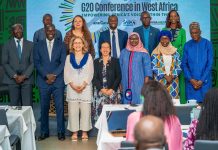By Thuku Kariuki
The African Development Bank placed women at the center of climate action during the Second Africa Climate Summit, convening high-level discussions on how to scale gender-responsive solutions in finance, policy, and data.
The event, “Scaling Up Gender-Responsive Climate and Energy Solutions: From Finance to Policy and Data,” was hosted at the Bank’s Pavilion in Addis Ababa’s International Convention Center. It highlighted innovative partnerships channeling resources to women-led businesses tackling the climate crisis.
Through its flagship Affirmative Finance Action for Women in Africa (AFAWA) program, the Bank has been breaking barriers that prevent women from accessing capital. Working alongside the Climate Investment Funds and civil society organizations, it has opened new pathways to support women entrepreneurs, unlock green financing, and ensure gender considerations are embedded in policy reforms.
“Women, particularly in rural areas, are bearing the brunt of climate shocks while often being excluded from decision-making, finance, and opportunities in the green economy,” said Jemimah Njuki, the Bank’s Director of Gender, Women Empowerment and Civil Society. “When women are empowered as leaders, innovators, and entrepreneurs, our collective response to climate change becomes stronger.”
Panelists included representatives from the Climate Investment Funds, South Africa’s National Business Initiative, Farm Africa, and UN Women. Angela Muraguri, Investment Manager at KawiSafi Ventures, welcomed the progress but noted that much more remains to be done: “Dedicating 35% of our fund to female-founded companies is only scratching the surface. Expanded partnerships are needed to tackle systemic inequality.”
The session also spotlighted the broader benefits of gender-responsive climate finance. Farah Outeldait of the Climate Investment Funds emphasized: “When women are empowered in energy systems – as users, entrepreneurs or decision-makers – we see that access improves, resilience grows, and communities thrive.”
Beyond mobilizing finance, the African Development Bank is positioning itself as a standard-setter for inclusive climate action, combining its role as financier with that of a knowledge broker. Kidanua Gizaw, coordinator of the Bank’s partnership with the Climate Investment Funds, underlined this commitment: “Through the climate funds we partner with and implement, we are ensuring that women and youth are at the center of Africa’s climate transition.”
A key announcement came from KawiSafi Ventures, an African Development Bank investment partner, which pledged that 35% of its $90 million Fund II will target female-founded energy transition companies.
Africa remains one of the regions most vulnerable to climate change, with women disproportionately affected by droughts, floods, and declining agricultural productivity. By anchoring women in the heart of climate finance and policy, the African Development Bank is working to ensure the continent’s transition is not only green but also inclusive.







